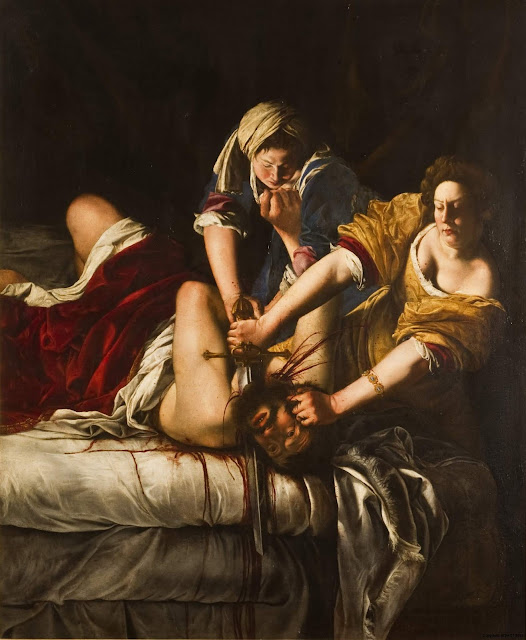She's the Bomb: Artemesia Gentileschi
Recently I had the honor of playing an incredibly badass woman onstage in a friend's directing class scene from the play It's True, It's True, It's True, which was originally produced by the Breach Theatre in England. The script was translated from Italian and Latin into English verbatim from the real court transcripts of Artemisia Gentileschi's rape case in 1612.
Artemisia Gentileschi was a painter in Italy during the Baroque era. Her father hired his friend, Agostino Tassi to mentor Artemisia in painting perspective. However, when she was fifteen, Agostino Tassi raped Artemisia and around two years later she brought the case to court, where she left victorious after an exhausting seven month trial in which she was physically tortured by the state in order to protect Tassi's name as he worked for the Pope at the time. One of the primary pieces of evidence in the case was a work-in-progress of Artemisia's "Judith Slaying Holofernes" (pictured below). The painting, based on the Old Testament story from the Book of Judith, depicts General Holofernes (who purposefully bears extreme resemblance to her rapist, Tassi) being beheaded by Judith. In the play and the original court documents it is stated that Tassi and an accomplice stole the painting from Gentileschi's household because they feared it would arouse suspicion due to its likeness to Agostino...if that doesn't scream GUILTY while also showing Artemisia's cleverness as an artist, then I don't know what does. Artemisia has a four minute monologue in scene seven of the dramatized transcripts where she describes what "Judith Slaying Holofernes" looks like and why she feels as though her representation of this story is the most accurate. It is a wildly powerful description that paints the picture without even seeing it in front of you.
Not only was Artemisia a wildly fierce woman in history and the art world, but she was also empowering to play as an actress. I feel like I've been stuck in a lot of sweet and quiet girl roles but I think that playing Artemisia helped me find a power and strength in myself I didn't know I had and show a side of myself to an audience that I don't usually get to show. It's incredible that she even attempted to take the case to court and even more remarkable that she won. Artemisia gave me an outlet for all of the anger and frustration I feel when I hear that yet another woman has experienced sexual violence and was denied justice.When I played Artemisia, even though it was just an excerpt of the play, I felt like for the first time I truly had the chance to channel my energy on the topic of sexual violence into an impactful and creative outlet.
Artemisia Gentileschi was a painter in Italy during the Baroque era. Her father hired his friend, Agostino Tassi to mentor Artemisia in painting perspective. However, when she was fifteen, Agostino Tassi raped Artemisia and around two years later she brought the case to court, where she left victorious after an exhausting seven month trial in which she was physically tortured by the state in order to protect Tassi's name as he worked for the Pope at the time. One of the primary pieces of evidence in the case was a work-in-progress of Artemisia's "Judith Slaying Holofernes" (pictured below). The painting, based on the Old Testament story from the Book of Judith, depicts General Holofernes (who purposefully bears extreme resemblance to her rapist, Tassi) being beheaded by Judith. In the play and the original court documents it is stated that Tassi and an accomplice stole the painting from Gentileschi's household because they feared it would arouse suspicion due to its likeness to Agostino...if that doesn't scream GUILTY while also showing Artemisia's cleverness as an artist, then I don't know what does. Artemisia has a four minute monologue in scene seven of the dramatized transcripts where she describes what "Judith Slaying Holofernes" looks like and why she feels as though her representation of this story is the most accurate. It is a wildly powerful description that paints the picture without even seeing it in front of you.
Not only was Artemisia a wildly fierce woman in history and the art world, but she was also empowering to play as an actress. I feel like I've been stuck in a lot of sweet and quiet girl roles but I think that playing Artemisia helped me find a power and strength in myself I didn't know I had and show a side of myself to an audience that I don't usually get to show. It's incredible that she even attempted to take the case to court and even more remarkable that she won. Artemisia gave me an outlet for all of the anger and frustration I feel when I hear that yet another woman has experienced sexual violence and was denied justice.When I played Artemisia, even though it was just an excerpt of the play, I felt like for the first time I truly had the chance to channel my energy on the topic of sexual violence into an impactful and creative outlet.



Comments
Post a Comment